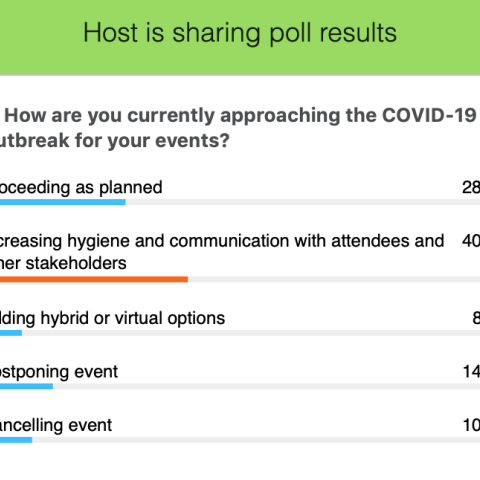Insurance and Legal Considerations for Event Professionals in the Wake of COVID-19

More than 2,200 event professionals attended the Events Industry Council live webinar, “COVID-19: Discussion of Critical Insurance and Legal Considerations for Event Professionals” webinar on Friday, March 6.
The webinar featured hospitality attorney Barbara Dunn, a partner in the Chicago office of Barnes & Thornburg LLP, and Tyra Warner, department chair of hospitality and tourism management at College of Coastal Georgia. Alisa Peters, senior global account manager for Experient, a Maritz Global Events Company and chair-elect of EIC’s CMP Governance Commission, facilitated.
EIC CEO Amy Calvert opened the webinar with a reference to the March 5 open letter from meeting and event industry leaders, urging event professionals to stay educated and base decisions around COVID-19 on facts, not fear. In case you missed it, here’s a recap of the conversation.
Many Events Are Still Going Ahead
News reports are full of event cancellations and postponements. But according to Peters, more than 19,000 conventions scheduled to be held over the next three months are still planning to proceed.
The results of a live poll taken during the webinar asking how attendees were currently approaching the COVID-19 outbreak for their events seemed to show that cancellations are still in the minority:
- Proceeding as planned — 28%
- Increasing hygiene and communication with attendees and other stakeholders — 40%
- Postponing event — 14%
- Cancelling event — 10%
- Adding virtual or hybrid options — 8%
To Cancel or Not to Cancel?
Warner said that there is no overarching right or wrong decision on whether to proceed or to cancel — but urged planners to look at management and mitigation techniques with their legal advisors.
She also cautioned against extremes, such as ignoring the reality of the virus or letting fear completely paralyze us. “It’s important that we’re realistic,” she said.
Dunn advises planners to look at the potential of cancellation as a business decision separate from potential losses. To do this, ask questions like: What is the purpose of your meeting? Can you still fulfill that purpose and accomplish those goals with reduced attendance or fewer sponsors? Then, review at what point that would change — if 10 percent of your attendees can’t make it, 20 percent, 30 percent?
Then, she said, chart full paths — the path of cancellation and the path of reduced attendance — and see what they look like, operationally and financially. Check all of your contracts to see what the penalties are.
“[Situations like coronavirus] are why we preach the importance of including a clause in every contract,” Dunn said. “Facility contracts, convention centers, hotels, large vendors, decorators, freight companies, caterers, destination management companies, etc.”
Also, set a date by which you’ll make a definitive decision regarding holding or canceling the event, and stick to it. That date may be tied to a deadline such as your exhibitors’ freight shipping deadlines, or a room block or catering attrition date.
Does Force Majeure Apply?
Many questions submitted by attendees to the webinar revolved around force majeure, amid concerns over cancellation fees and attrition penalties.
Force majeure is the clause in contracts that stipulates that planners can terminate an event without incurring any liability or damages because it is impossible, illegal or commercially impracticable to hold the event.
For planners hoping to use force majeure to cancel over coronavirus fears, Warner cautioned that at least for the majority of U.S. events, we are not currently in a situation where force majeure can be invoked, even for cities that have declared a state of emergency. She explained that when cities or states declare a state of emergency, it is generally to free up funding or to get federal funding, and is not considered force majeure.
Dunn provided a clear example of force majeure: Switzerland, where the country’s government has banned public assemblies of more than 1,000 people through at least March 15.
However, she also said that there may be cases where force majeure could be invoked. For example, if you can show a critical mass of your attendees can't travel to the meeting because of their company-imposed travel restrictions, that may rise to the level of rendering performance of the contract by the group commercially impracticable.
Dunn urged planners to think ahead and plan ahead. “If your meeting is in 60-90 days, this is exactly when you should be taking notes of what other groups are doing and begin to map your holding statements on either path,” she said.
Liability Insurance Can Be a Saving Grace
Dunn described liability insurance as the backbone of all types of insurance that any organization should have.
“Cancellation insurance is really business interruption insurance,” she explained, “and the most important page of an insurance policy, whether it's your car insurance or your liability insurance — or your cancellations — are the exclusions.”
If infectious or communicable diseases are not listed as an exclusion, or you purchased an endorsement or rider to include this scenario, your insurance should cover cancellation. Dunn said that some insurance will also cover a reduction in performance due to lower attendance related to the coronavirus, depending on wording — but urges all event professionals to get their own legal advice from a lawyer who has thoroughly reviewed their specific contracts.
Dunn also advised providing written notice of a possible claim as far in advance as possible — even if you think you’re not going to cancel your meeting. “One of the main ways insurance carriers try to get out of covering groups is if they fail to give timely notice,” she said.
Take a Collaborative Approach
Given the widespread nature of the coronavirus, everyone in the industry will be impacted in one way or another. Calvert recommends a collaborative approach, working together with partners, suppliers and other stakeholders to make good decisions that protect everyone.
Talk with your hotels, venues and vendors. They’ll want to work with you, not against you. Come up with creative ways to mitigate loss. For example, work with the venue’s caterers to select menus that could be easily scaled up or down based on attendance helps to minimize both waste and costs. Or, postpone your event rather than flat-out canceling it.
“This is an industry that supports 26 million jobs,” Calvert said in closing the webinar. “We want to make decisions that are grounded in facts and work to manage fear and emotions through this time. Consider the impact [of canceling your event], and if you do have to [cancel or] postpone, think about what else you can do to help support these communities.”
Watch a recording of the EIC webinar, “COVID-19: Discussion of Critical Insurance and Legal Considerations for Event Professionals,” here.
Don't miss any event-related news: sign up for our weekly e-Newsletter HERE and engage with us on Twitter, Facebook and LinkedIn!


Add new comment